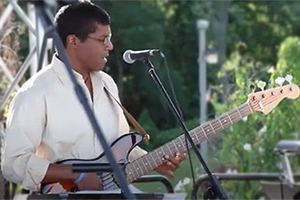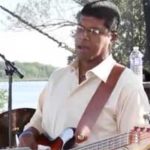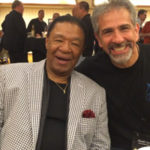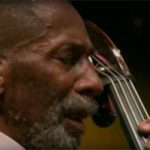Veteran L.A. studio bassist opens up about recent projects and working with Stanley Clarke
Exclusive interview with FBPO’s Jon Liebman
Nov. 8, 2021
If you’re looking for a word to describe Reggie Hamilton, versatile is a fitting one. A wizard on both electric and upright, the New York native has earned a reputation for working in many styles, including R&B, classical, rock, jazz, and funk. Currently based in Los Angeles, Hamilton is an A-list session musician and sideman, known for his work with artists like Stanley Clarke, Boyz II Men, Mariah Carey, Seal, John Mellencamp, Barbra Streisand, Toni Braxton, and Aaron Neville, among others. His work has also appeared in numerous movies, including the animated film Anastasia. His solo album, My Village, was released in 2007.
FBPO: It’s been 11 years since your last interview.
RH: Wow!
FBPO: So, what’s going on? What’s keeping you busy these days?
RH: Everything, I guess. I do a good bit of sessions at home. I play bass with Chris Botti, and I have been for the last four years. And he’s fun. He’s a great, great guy. He’s a great client and just a great human being.
FBPO: Are you playing more upright or electric these days?
RH: Well, let’s see… Last week I had to play on some Sudanese tune that was electric-based, and I spent the week playing primarily electric guitar and upright on one thing. Then as soon as I got back, I had a flamenco session where I played upright. Chris Botti is upright and electric, maybe 65% upright, 35% electric.
FBPO: In your first interview, you touched on your association with Stanley Clarke. Can you tell me a little more about that relationship?
RH: I first met Stanley and George (Duke) in 1985. I was playing a telethon in Philadelphia. In fact, Joey DeFrancesco must have been 15 years old – he was ridiculous then – and just started playing “School Days” as a joke, and Stan turns like, “Uh-uh, don’t do it.” So fast-forward, it’s Christmastime, 1987. Stanley used to have all the refugees from LA, pretty much wayward musicians that had no place to go, come to his house for Christmas dinner. And so, he invited me into the studio and I got my first chance to look at Digital Performer. Oh no, it was still Performer then. It was a Mac Plus, something like that.
FBPO: I remember. I had it myself. With the three-and-a-half inch floppy disk?
RH: Yeah, exactly right! And he basically hired me the next day. So I ended up working on Sunnie Paxon’s record, and then I started working for Stanley. Sunnie and I would write little cues, mostly soundalikes, or occasional Latin cues. And then, Stanley and Carolyn (Clarke) would have me play on stuff. First, I started playing bass on his movies, then I started playing bass in the orchestra on his stuff as well. So it’s pretty neat.
FBPO: Why wouldn’t Stanley do the bass parts himself?
RH: He was producing. He had other focuses and I think he just liked giving young guys a chance, really. It’s not that he couldn’t play any of that stuff easily.
FBPO: Tell me about your gear.
RH: As far as basses go, I play the Fender still, and I play Fodera. I have a little headless Steinberger that I’ve been using, because I’ve been waiting for Fodera to make me another bass. They’re making a headless bass right now, which should be done very soon. My relationship with Fodera is longer than my relationship with Fender. I still have the signature Jazzes that I use, and two old Jazz Deluxes, which are the first basses that I got at Fender. They’re both fabulous. Then I’ve got a signature series that I use a lot, and occasionally I’ll use some other things. On a session that I did the other day, I played a Danelectro baritone. I still have uprights. I have a beautiful Italian five-string by Ciciliati, it’s modern.
FBPO: What’s the fifth string on and upright? Is it a C?
RH: Well, mine is a low B.
FBPO: That makes sense. The reason I asked is because, in the classical world, the fifth string often tends to be a C, patterned after the cello.
RH: Well, actually, from a technical standpoint, the C makes more sense than the B. I’ll tell you why.
FBPO: Tell me why…
RH: With the B string, you’re dealing with overtones. But I use Hipshot (to avoid those). I love Hipshot stuff! They were standard on all my signature models on the four-strings, as well as the five-strings. And I have them on my Fodera as well. I’m a big believer in them.
FBPO: What kind of strings do you use?
RH: I still have a stock of the old Fender strings. I tried using the modern Fender strings and they’re cool, but the old stock, there’s something about the alloy, the stainless steel, something about the way it was wound, everything was great. I really did love those strings a lot, and I used them on a lot of records, a lot of things.
FBPO: What about for on the upright?
RH: I have La Bella strings for upright, for my piccolo bass. And I use regular La Bella strings for my acoustic bass guitar.
FBPO: What do you like about the La Bella strings for the upright?
RH: It depends on the bass. I like the 7720s. The nylon. They sound really neat. And the 7710s. It’s a clear, but warm sound. You what I mean? You can hear Buster Williams, you can hear Ron Carter. That’s enough for me. And Stanley. I bow on them too.
FBPO: What kind of pickups do you have on your uprights?
RH: I have the David Gage Realist, the Wood Realist, the Fishman Full Circle, the Fishman BP-100, when I travel, and on one of these I have a Wilson. But the Full Circle is super solid. I use the Full Circle and the Wood Realist in most, because on the gig with Botti, we’re on the road 250 days a year, and every night it’s a rental bass. It’s like having a different wife every night. And they don’t all like pizza!
FBPO: What advice do you have for someone who wants to learn to play bass? What do you think is important?
RH: Well, it varies from where you are in your stage in your life, of course, and for what your goals are. If they’re trying to get in college, they’re going to be wildly different from playing at the local club on the weekends. Playing at the local clubs on the weekends, we find music we like. And I’ve had students that were in both situations. For guys that are in their 50s through 70s, find music you like, but take your time and enjoy the process. Don’t beat yourself up. Don’t be self-deprecating or negative, because that never helps. Beating up the subconscious helps absolutely nothing. But really, just enjoy the process. Find people that you really like to play with. It’s the same, like you don’t want to go and have a coffee with a person that’s negative all the time. That makes you feel bad that you even have a coffee in your hands. So don’t play with musicians like that.
FBPO: Good interaction between musicians is really important.
RH: Yes. As soon as you can, get out and play with other people. There’s a huge difference in what your groove is, and developing an internal sense of time, and playing with other people and really making music. It’s hugely different than it was when I was young or when my predecessors were young. And when we wonder why things are so bad, and why things have changed so much, we have to look to ourselves. How do we want music to be? Sure, playing a piano concerto is fine. But playing along with the track to show that you can play along next to “Sir Duke” to get more views, that’s bonkers. It’s pretty nutty. So get out and play with other people, whether it’s another bass player, a trumpet player, a flute player, a pianist, a drummer, conga player, someone who plays guitarrón, an oboist… Something. Anything. Anything, anything. But get out and play with other people. That’s music.
FBPO: What would you be if you weren’t a bass player?
RH: That’s an interesting question. My father wanted me to be a mathematician, but I have not the wherewithal to do that. If I could choose, probably something isolated that allows me to work on my own. I can hang and do all the hanging and the like, but I tend to be more reclusive. I probably could have been a fairly decent luthier. I like working on instruments. Nothing in an office that required me to say hello to people every day, or have coffee with them, or talk to them at the water cooler. I’d be so fired, it’s unbelievable.
See Jon’s blog, with key takeaways from this interview here.




